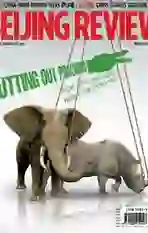The Fight Against Poachers
2014-03-04
“No buying, no killing.” The slogan raises awareness of an international poaching crisis, but the truth is that endangered wildlife species face a variety of grave threats.
Aside from publicizing the importance of protecting wildlife, tougher penalties need to be implemented to prohibit poaching and smuggling. From December 30, 2013 to January 26, 2014, China led a campaign against transnational wildlife crimes, in cooperation with 27 other countries and international organizations. The operation, code-named Cobra II, inflicted a stunning blow on poachers and smugglers. It cracked over 350 cases involving more than 400 suspects, and captured more than 3 tons of ivory and ivory products, including over 1,000 hides and a number of other wildlife products.
Wildlife poaching and smuggling has become a serious global issue. As early as September 2012, the Chinese Government called for a multinational crackdown on the crimes, initiating the first Operation Cobra, involving 22 countries, in early 2013.
The two Cobra operations show that the international community is highly united and strongly determined in cracking down on crimes of wildlife poaching and smuggling. Furthermore, Cobra operations have provided a strong example of joint law enforcement and offer international cooperation experience in each participating country.
Wildlife smuggling cannot be resolved by only one country or even several international operations. All countries involved should prepare to make enduring efforts to control wildlife crimes. During the Operation Cobra II, joint law enforcement activities encountered difficulties.
Nature is an integrated whole. Once a biological chain is destroyed, the rest of nature will fall into irretrievable chaos. Thus, protecting wildlife and endangered species is a measure of protecting the human race. Following the Operation Cobra II, people shall call for more international campaigns to fight against wildlife poaching and smuggling.
